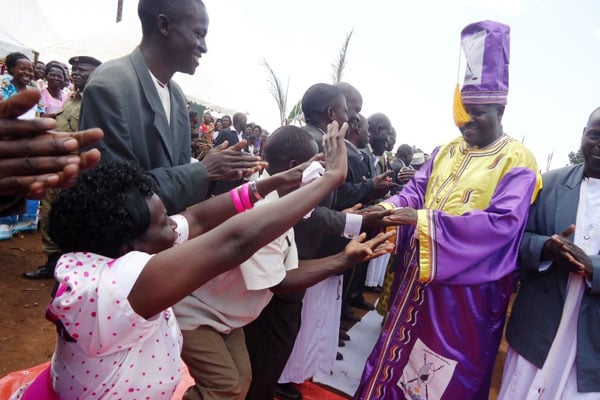Ssabanyala marks 10 years

Cheerful. Ssabanyala Baker Kimeze greets his subjects at a function at Bbaale County headquarters in Kayunga District in 2016. PHOTO BY FRED MUZAALE
What you need to know:
- Achievement. Chiefdom officials say there is unity between the Banyala and Buganda Kingdom.
Kayunga. The Banyala cultural leader, Rtd Maj Baker Kimeze, will this Saturday celebrate 10 years on the throne with the event being held at the contested Bbaale Sub-county headquarters.
The celebrations are expected to be presided over by President Museveni.
Mr Kimeze took over from his late father Nathan Mpagi (the first Banyala cultural leader), who died in 2008 but his first seven years on the throne were characterised by fights with Buganda Kingdom.
However, with the signing of the Memorandum of Understanding between the central government and Buganda Kingdom in 2013, the relationship between the two cultural entities is slowly improving. The Buganda king Ronald Mutebi II has visited Kayunga District thrice since the 2009 infamous Buganda riots.
The riots were the peak of icy relationship between the two institutions with Kabaka Mutebi being blocked from visiting Kayunga District over what government claimed was due to security concerns.
Buganda Kingdom does not recognise the Bunyala chiefdom claiming that it is a mere creation of the NRM government, something government denies.
President Museveni says they restored the chiefdom with an aim of protecting the Banyala from “oppression by Mengo”.
However, as the Banyala celebrate their 10 years’ achievements, they have a task of mending fences with Buganda Kingdom.
The Bunyala chiefdom premier, Mr Martin Ssenkatuuka, says their relationship with Mengo is no longer strained as it was in the past five years.
“Our relationship with Mengo has greatly improved. This is clearly manifested in the fact that the Kabaka and any kingdom official is now free to visit Kayunga District,” says Mr Ssenkatuuka.
However, the Buganda Kingdom spokesperson, Mr Noah Kiyimba, maintains that the Banyala are like any other ethnic group within Buganda and are under the Kabaka.
“Baganda have always been hospitable. We accommodate other ethnic groups, but that should not mean that when they [ethnic groups] settle in Buganda, they should create their own chiefdoms,” Mr Kiyimba says.
Milestones
According to the 2014 National Housing and Population Census, the Banyala constitute only five per cent of Kayunga District population which currently stands at 368,062, a figure Mr Ssenkatuuka disputes.
Despite all this, Mr Ssenkatuuka says they have all the reasons to celebrate. “In the 10 years, we have achieved unity among the Banyala. There were warring groups that were fighting for the throne, but they have all united and are in support of the Ssabanyala,” he says.
He wonders why Mengo is still agitating for the installation of Prince Fred Kayemba as the Banyala chief under the title Namuyonjo. According to the Buganda Kingdom, Namuyonjo is the traditional title of the leader of Banyala Cultural Institution, which dates back more than two centuries.
Mengo says Kayemba is the 13th Namuyonjo and the current head of the Banyala royal family to which Kimeze is not a member.
According to Mr Ssenkatuuka, Shs3b has been secured for the construction of the chiefdom administrative office block at Bbaale County headquarters.
This, he says, will enable them have an official place where they can conduct chiefdom affairs.
“We have revived our 129 clans which has helped us preserve the Kinyala culture and norms because a tribe without these [clans], is not worth existing,” he says.
He adds that the Ssabanyala has been able to fight for the land rights of his subjects in an area where land grabbing is rampant.
The Ssabanyala in 2016 ordered Buganda Land Board officials to halt their activities of “kyapa mu ngalo” in Kayunga ,saying it is meant to extort money from poor tenants.
Kyapa mu ngalo translated as land title in your hands campaign aimed at helping registered tenants on Kabaka’s land but without enough money to acquire renewable lease titles of 49 years at a subsidized cost of up to 70 per cent of the market prices.
The chiefdom spokesperson, Mr James Rwebikire, says they have already translated the Bible into Lunyala and the Lunyala dialect dictionary is in the making.
Mr Rwebikire says a 60–member cabinet has been established to run the affairs of the chiefdom.
“With these achievements in such a short time, we see a bright future under the stewardship of Ssabanyala,” Mr Rwebikire says.
According to Mr Ssenkatuuka, their biggest challenge is government’s delay to gazette their chiefdom. “Because we are not yet gazetted, we cannot get funding from international organisations, which impedes implementation of some of our activities,” he says.



